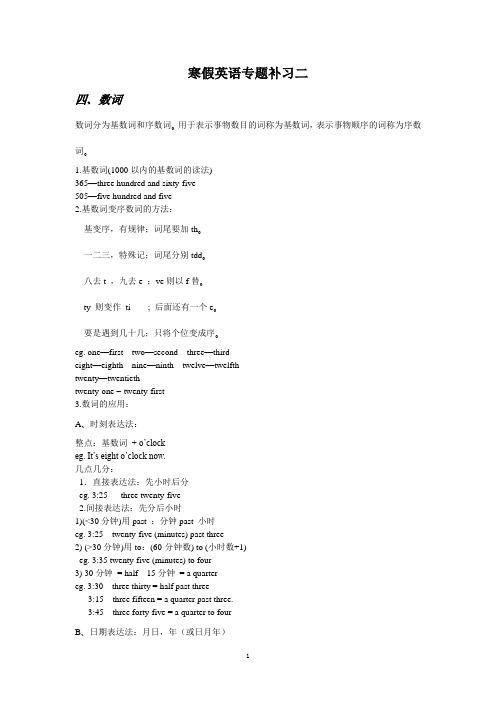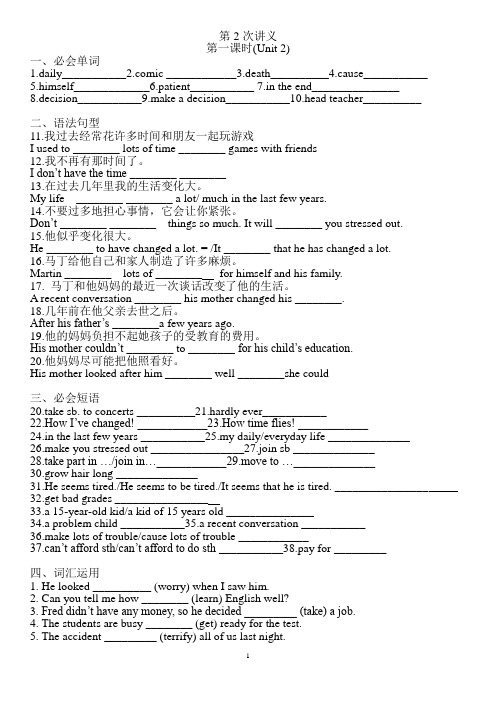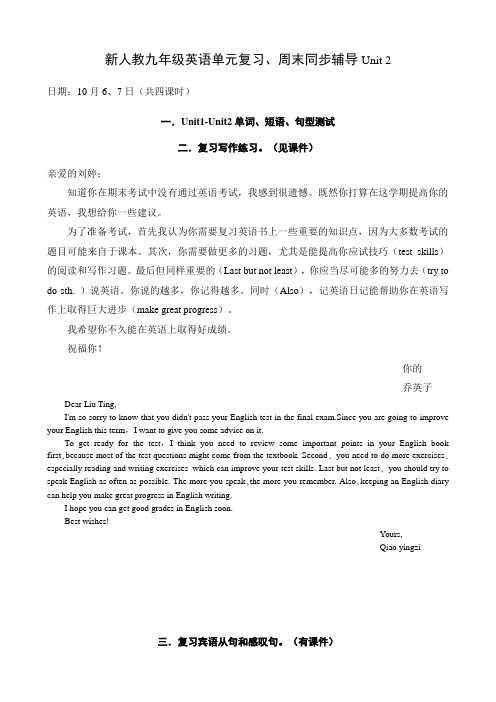九年级英语寒假补习第二次讲义
- 格式:doc
- 大小:92.50 KB
- 文档页数:4

寒假英语专题补习二四、数词数词分为基数词和序数词。
用于表示事物数目的词称为基数词,表示事物顺序的词称为序数词。
1.基数词(1000以内的基数词的读法)365—three hundred and sixty-five505—five hundred and five2.基数词变序数词的方法:基变序,有规律;词尾要加th。
一二三,特殊记;词尾分别tdd。
八去t ,九去e ;ve则以f替。
ty 则变作ti ; 后面还有一个e。
要是遇到几十几;只将个位变成序。
eg. one—first two—second three—thirdeight—eighth nine—ninth twelve—twelfthtwenty—twentiethtwenty-one –-twenty-first3.数词的应用:A、时刻表达法:整点:基数词+ o’clockeg. It’s eight o’clock now.几点几分:1.直接表达法:先小时后分eg. 3:25 three twenty-five2.间接表达法:先分后小时1)(<30分钟)用past :分钟past 小时eg. 3:25 twenty-five (minutes) past three2) (>30分钟)用to:(60-分钟数) to (小时数+1)eg. 3:35 twenty-five (minutes) to four3) 30分钟= half 15分钟= a quartereg. 3:30 three thirty = half past three3:15 three fifteen = a quarter past three.3:45 three forty-five = a quarter to fourB、日期表达法:月日,年(或日月年)1949年10月1日:October1st , nineteen forty-nine=the first of October, nineteen forty-nine2000年: the year two thousand=twenty hundred2001年: twenty o one3月1日: March the first = the first of MarchC、表编号:第207房间:Room 207第五课:Lesson 5 = the fifth lessonD、序数词与不定冠词(a; an)连用表―又一;再一‖eg. You’ve done it three times. Why not try a fourth time?E、分数的表达:分子(基数)、分母(序数)eg. one third 三分之一two thirds 三分之二注意:1.分子超过1时,分母加s2.含分数的短语作主语由分数后的词决定谓语eg.1)One third of the students are girls.2)One third of the milk is mine.3.分数的特殊形式1)one third = a third2)one fourth = a quarterthree fourths = three quarters3)one second = a halfF、一些数词的复数+ of表约数:hundreds of ; thousands of ; millions of练习( )1.If you go out at night, you’ll be able to see ____ starts.A. thousands ofB. thousand ofC. nine thousands ofD. thousands( )2.Monday is ___ day of the week.A. firstB. the firstC. the secondD. second( )3.You’ve do ne it twice. Why not try ____ time?A. thirdB. the thirdC. a thirdD. once( )4.Which is the____ month? It’s September.A. nineB. ninethC. ninthD. ninety( )5.December is ___ of the year.A. the twelfth monthsB. the twelfth monthC. the twelveth monthsD. twelve months( )6.There are ___ floors in the building and he lives on the ____ floor.A. eighteen, fifteenB. eighteenth, fifteenthC. eighteen, fiveteenD. eighteen, fifteenth( )7.I was born ___, 1982.A. on June 2rdB. in June 2ndC. on June twoD. on June 2( )8.It’s ____ from our home to the zoo.A. two and a half hours’ walkB. a half and two hours walkC. two hours and a half hour’s walkD. two and a half hour’s walk( )9.What time is it now? It’s ___ to six.A. quarterB. a quarterC. quarto C. a quarto( )10.Will you be back in ____ ?A. one or two minutesB. one minute or twoC. two minutes or oneD. two or one minute( )11.Mary’s uncle went to France ____.A. in his thirtiesB. on his thirtiesC. at his thirtiesD. about his thirties( )12.The headmaster wrote a ___ report.A. two thousand wordsB.two-thousand-wordsC. two-thousand wordsD. two-thousand-word( )13.____of the apples in the fruit bowl are soft and sweet.A. Two-thirdB. Second-thirdC. Two-thirdsD. Second-thirds( )14.We have learned about ____ these days.A. several hundreds English wordsB. hundreds of English wordsC. hundred of English wordsD. several hundred English word( )15.A UN report says that the word population will pass six billion by the end of ____ century.A. twentiethB. twentyC. the twentiethD. the twentyth五、介词1.in; on; at用在时间词前,表―在‖1)at + 具体时刻2)on + 具体某天(具体某天的上、下午等;星期词;以及上、下午词前有修饰词时)3)in + 年、月、季节及一天中的某部分但注意:at night= in the night at noonat this / that time at Christmaseg. 1.___ the morning 2.___ Monday morning3. ___ a rainy evening4. ___3:505.__ 20026.___ the morning of April 107.___ spring8.___ night 9.___ this time 10. ___ March另外注意:在时间词(morning , afternoon , evening ; Sunday…)前有last, next , this , that时,不再用介词. tomorrow, tonight前也不用介词。

第2次讲义第一课时(Unit 2)一、必会单词1.daily___________ic ____________3.death__________4.cause___________5.himself_____________6.patient___________7.in the end_______________8.decision___________9.make a decision___________10.head teacher__________二、语法句型11.我过去经常花许多时间和朋友一起玩游戏I used to ________ lots of time ________ games with friends12.我不再有那时间了。
I don’t have the time ________ ________13.在过去几年里我的生活变化大。
My life ________ ________ a lot/ much in the last few years.14.不要过多地担心事情,它会让你紧张。
Don’t ________ ________ things so much. It will ________ you stressed out. 15.他似乎变化很大。
He ________ to have changed a lot. = /It ________ that he has changed a lot.16.马丁给他自己和家人制造了许多麻烦。
Martin ________ lots of ________ for himself and his family.17. 马丁和他妈妈的最近一次谈话改变了他的生活。
A recent conversation ________ his mother changed his ________.18.几年前在他父亲去世之后。

中考英语九年级寒假尖子班专题讲义
第一节:阅读理解
策略一:首先抓住题目中的关键词
例如:文章的标题,某个人名或者地名,数字或日期等等。
这
可以帮助我们更快地找到答案。
策略二:仔细阅读题目和文章
精读题目,确定问题确切的询问内容、时间或其他要求。
精确
阅读文章,并了解文章主题和作者的意图。
策略三:为每个问题留出足够的时间
我们应该对每个问题给予同样的关注。
如果我们没有找到答案,可以留出一些时间,再次阅读一遍问题和文章。
第二节:完形填空
策略一:阅读文章和问题
全文扫读,通过关键词快速了解文章。
精读文章,理解上下文关系,确定文章内容。
通读问题,确定空缺的位置。
策略二:注重上下文关系
了解文章上下文的同时,能够综合判断答案的可能性。
策略三:利用猜测
总结并记忆词组、搭配和句型。
了解词义,从而在没有一些关键信息的情况下最大限度地猜测答案。
第三节:写作
策略一:明确写作目的
考虑写作的目的,包括文体和定位。
策略二:确定写作思路
抓住文章的中心话题,根据中心话题开展展开写作。
策略三:使用恰当的词汇和语法
避免使用复杂的句子和不符合语法规则的词汇。
使用口语化的短语,简洁清晰。
以上是中考英语九年级寒假尖子班专题讲义的部分内容,希望大家在复习备考时有所帮助。

【教育机构专用】2020-2021学年九年级英语寒假讲义(人教新目标版)Education is a fundamental pillar of society that shapes the minds and futures of young individuals. The 2020-2021 academic year has presented unique challenges due to the COVID-19 pandemic, requiring innovative approaches to ensure students continue to receive quality educational experiences. The Grade 9 English Winter Vacation Workbook (People's Education Press New Target Version) is a valuable resource designed to support students during this critical time.The workbook is structured to provide a comprehensive review of key concepts and skills covered throughout the first half of the academic year. It is divided into thematic units that align with the New Target curriculum, allowing students to consolidate their understanding and prepare for the upcoming semester. Each unit features a variety of engaging activities, including reading comprehension exercises, vocabulary development tasks, and grammar practice.One of the standout features of the workbook is its focus on developing well-rounded language proficiency. The reading passages cover a diverse range of topics, from literature and history to science and current events. This breadth of content not only enhances students' understanding of the English language but also expands their knowledge of the world around them. The vocabulary exercises, meanwhile, target both high-frequency words and subject-specific terminology, equipping students with the linguistic tools to excel in their academic pursuits.The grammar section of the workbook is particularly noteworthy, as it delves into the nuances of English grammar in a systematic and engaging manner. Students are guided through the proper usage of verb tenses, sentence structures, and parts of speech, with ample opportunities to apply their knowledge through interactive exercises. This comprehensive approach to grammar instruction not only strengthens students' written communication skills but also lays a solid foundation for their continued language development.In addition to the core academic content, the workbook also includes a section dedicated to developing essential study skills. This includes strategies for effective time management, note-taking techniques, and test-taking strategies. By equipping students with these valuable tools, the workbook empowers them to become more independentand self-directed learners, better prepared to navigate the challenges of secondary education.One of the most notable aspects of the Grade 9 English Winter Vacation Workbook is its alignment with the New Target curriculum. This ensures that the content and activities seamlessly integrate with the classroom instruction students have received during the first half of the academic year. This cohesive approach reinforces the learning objectives and provides a smooth transition into the second semester.Furthermore, the workbook's user-friendly design and clear instructions make it an invaluable resource for both students and teachers. The layout is visually appealing, with ample white space and strategic use of color to enhance readability. The instructions for each activity are concise and easy to follow, allowing students to work through the exercises with confidence and minimal guidance.In terms of assessment, the workbook includes a comprehensive review section that consolidates the key concepts covered throughout the various units. This not only helps students identify their strengths and weaknesses but also serves as a valuable tool for teachers to gauge student progress and tailor their instructional strategies accordingly.The Grade 9 English Winter Vacation Workbook (People's Education Press New Target Version) is a testament to the dedication and expertise of the educational professionals who have created it. By providing a structured and engaging learning experience, the workbook empowers students to maintain their academic momentum during the winter break and enter the second semester with a strong foundation in English language proficiency.In conclusion, this workbook is an invaluable resource for Grade 9 students and their teachers. It seamlessly integrates with the New Target curriculum, offering a comprehensive review of key concepts and skills while also fostering the development of essential study habits and language proficiency. The workbook's user-friendly design, diverse content, and alignment with educational best practices make it a valuable tool for supporting student success in the 2020-2021 academic year and beyond.。

初三英语08寒假Challenge Two Name Date Score__________26. Henry works in the library now, but he ____ on a farm for three years.A. worked B had been working C. had worked D. has worked27. I should very much like to have gone to that party of theirs, but ______.A. I was not invitedB. I’m not among the invitedC. I had not been invitedD. I have not been inviting28. In 1960, this was the longest bridge that _____________.A. was ever builtB. had ever builtC. has ever been builtD. had ever been built29. It’s up to you to decide whether to _____ physics or chemistry.A. take offB. take onC. tale inD. take up30. I suppose reading this book will ____ your taste for music.A. addB. add upC. add toD. add up to31. Now he has been used to ______ early for morning exercise.A. get upB. getting upC. got upD. going to bed32. Zhong Nanshan is a famous expert who has _____ to ____ the origin of SARS.A. devoted; studyingB. been devoted; studyingC. devoted; studyD. been devoted; study33. Do you know the girl _____ just now?A. to who I noddedB. I nodded toC. I nodded to herD. that has been seen34. The mayor of Beijing says that all construction work for the Beijing Olympics___ nowA. has been completedB. has completedC. will have been completedD. will have completed35. None would have dreamed of there _____ such a beautiful place.A. beingB. beC. to beD. is36. —You seem to have had that car for years. ---Yes, I should sell it ____ it still runs.A. beforeB. duringC. untilD. while37.--- Excuse me, i s this Mr. Brown’s office?--- I’m sorry, but Mr. Brown ____ works here. He left about three weeks ago.A. not nowB. no moreC. not stillD. no longer38. Early ____ the morning of May 1, we started of _____ the mountain village.A. in; forB. in; toC. on; toD. on; for39. He has been caught ____ the rain and is wet ___ the skin.A. by; toB. in; toC. in; throughD. with; in40. We need fifteen more people ____ our team to do the job.A. butB. exceptC. as wellD. besides41. _____ my finishing reading the novel, you shall have it immediately.A. OnB. AtC. ForD. With42. She looks quite young _____ her age.A. atB. byC. forD. to43. Books are the most important records we keep_____ man’s thoughts, ideas a ndfeelings.A. upB. ofC. forD. on44. My daughter comes home from school and then spends an hour on the phone talkingto the very people she has been at school _____ all day.A. forB. onC. 不填D. with45. He is ____ China Daily. In other words, he works ______ China Daily.A. on; forB. for; onC. in; atD. at; on46. —How far is it to the railway station?—It’s only three miles _____ my house.A. out ofB. toC. awayD. beyond47. When I handed the report to John he said that George was the person ______.A. to sendB. for sending itC. to send it toD. for sending it to48. You can either fly to Abu Simbel or you can take a boat from ____ the lake.A. acrossB. throughC. onD. in49. This room is fifteen feet long ____________ twelve feet wide.A. toB. ofC. byD. in50. Our country has a ____ history of 4000 years.A. recordingB. recordedC. recordD. records【New words and expressions】★equal v. 等于A equals B与...相匹敌None of us can equal her, either in beauty or as dancer Mary is quite equal to John in brains.be equal to: 有能力、有力量来做某事to- 介词★vicar n. 牧师★raise v. 募集,筹(款)提高、饲养、供养、种植、召集、招募、提出、发出'You certainly did give me a surprise!' said the vicar. 'You've probably woken up everyone in the village as well. Still, I'm glad the bell is working again.'That's the trouble, vicar,' answered Bill. 'It's working all right, but I'm afraid that at one o'clock it will strike thirteen times and there's nothing I can do about it."We'll get used to that, Bill,' said the vicar. "Thirteen is not as good as one, but it's better than nothin g. Now let's go downstairs and have a cup of tea.'1、介词的分类与语法功能(1)介词是虚词,不能单独作句子成分,必须与名词、代词(或相当于名词的其他词类、短语或从句等)构成介词短语,在句中充当一个成分。

新人教九年级英语单元复习、周末同步辅导Unit 2日期:10月6、7日(共四课时)一.Unit1-Unit2单词、短语、句型测试二.复习写作练习。
(见课件)亲爱的刘婷:知道你在期末考试中没有通过英语考试,我感到很遗憾。
既然你打算在这学期提高你的英语,我想给你一些建议。
为了准备考试,首先我认为你需要复习英语书上一些重要的知识点,因为大多数考试的题目可能来自于课本。
其次,你需要做更多的习题,尤其是能提高你应试技巧(test skills)的阅读和写作习题。
最后但同样重要的(Last but not least),你应当尽可能多的努力去(try to do sth. )说英语。
你说的越多,你记得越多。
同时(Also),记英语日记能帮助你在英语写作上取得巨大进步(make great progress)。
我希望你不久能在英语上取得好成绩。
祝福你!你的乔英子Dear Liu Ting,I'm so sorry to know that you didn't pass your English test in the final exam.Since you are going to improve your English this term,I want to give you some advice on it.To get ready for the test,I think you need to review some important points in your English book first,because most of the test questions might come from the textbook. Second, you need to do more exercises, especially reading and writing exercises which can improve your test skills. Last but not least, you should try to speak English as often as possible. The more you speak,the more you remember. Also,keeping an English diary can help you make great progress in English writing.I hope you can get good grades in English soon.Best wishes!Yours,Qiao yingzi三.复习宾语从句和感叹句。
Unit2I think that mooncakes are delicious!一.重点词汇陌生人亲属;亲戚增加(体重);发胖磅(重量单位);英镑(英国货币单位)偷;窃取,(过去式,过分)放置;安放;产(卵);下(蛋)(过去式,过分)摆开;布置平躺;处于(过去式,过分)说谎(过去式,过分)(饭后)甜点;甜食欣赏;仰慕领带v.捆;束款待;招待v.招待;请(客)圣诞节(长篇)小说死的;失去生命的,(动词)(过去式)(名词)生意;商业处罚;惩罚警告;告诫现在;礼物adj.现在的温暖;暖和(n./adj.),传播;展开蔓延;传播(vt./n.)(过去式)二、重点短语1.five pounds体重增加了五磅lose weight2.两星期内3.与.......相似4.water each other互相泼水5.呈…的形状6.摆开;布置7.拒绝做某事8.have good in the new year在新的一年里有好运气9.最终成为;最后处于以…结束10.与…分享…11.结果12.(两者中)一个…另一个…一些….其他的13.关心14.乔装打扮装扮成15.play sb.捉弄某人16.分发放弃17.的重要性18.带某人到处走走19.警告某人(不)做某事20.新生命的开始21.使某人回想起…提醒某人做某事22.承诺做某事32.用/以…对待某人三、重点句型1.I am going to Chiang Mai in two weeks.2.I believe that April is the hottest month of the year3.What a gr eat day!4.I guess it was a little too crowded.5.Marely used t o be just like Scrooge.used t o do sth./be used to doing sth./be used to do sth.的区别used t o do sth.意为“过去常常”,其后跟动词原形,表示过去的习惯、经常发生的动作或状态。
初中英语补习教学大纲教学大纲教学目标:1、对音标和音标的拼读有系统的了解和掌握2、熟练掌握初一上下册的单词和课文3、熟记初二上册前六个模块的单词意思4、通过做题掌握解题技巧总体教学内容:教授48个音标以及单词的拼读;地毯式把初一上下册的单词和课文详细过一遍;辅以初一上册的五三练习册,着重讲解阅读的解题技巧。
教学步骤:第一次课:主要系统地教授元音,然后开始教单词的拼读,在拼读的过程中通过渗透的方式教授辅音,到一定程度再把元音和辅音做一个归纳。
第二次课:复习音标,讲初一上册第一单元的单词,让学生记住单词的意思,在这个基础基础上讲解第一单元的课文。
第三次课:回顾第一单元的重难点,讲初一上册第二单元的单词,让学生记住单词的意思,在这个基础基础上讲解第二单元的课文,讲解初二第一单元的单词(具体情况视学生在校进度而定)。
第四次课:回顾重难点,讲初一上册第三单元的单词,课文,复习初一下册第10单元的单词。
第五次课:讲初一上册第四单元的单词,课文。
预习初二第二单元的单词,穿插讲解阅读技巧。
第六次课:回顾重难点,讲初一上册第五单元的单词,课文。
复习初一下册第九单元的单词,做阅读练习并讲解阅读技巧。
第七次课:讲初一上册第六单元的单词,课文。
预习初二第二单元的单词,复习讲解阅读。
第八次课:回顾重难点,讲初一上册第七单元的单词,课文。
复习初一下册第八单元的单词,讲解阅读技巧。
第九次课:讲初一上册第八单元的单词,课文。
预习初二第三单元的单词讲解交际用语的解题技巧。
第十次课:回顾重难点,讲初一上册第九单元的单词,课文。
预习单词,讲解交际用语的解题技巧。
第十一次课:回顾重难点,讲初一上册第十单元的单词,课文。
预习初二第四单元的单词,讲解交际用语技巧。
第十二次课:回顾重难点,讲初一下册第一单元的单词,课文。
预习单词,讲解单项选择的技巧。
第十三次课:回顾重难点,讲初一下册第二单元的单词,课文。
预习初二第五单元的单词,讲解单项选择的技巧。
Unit 2 I think that mooncakes are delicious!一.重点词汇陌生人亲属;亲戚增加(体重);发胖磅(重量单位);英镑(英国货币单位)偷;窃取,(过去式,过分)放置;安放;产(卵);下(蛋)(过去式,过分)摆开;布置平躺;处于(过去式,过分)说谎(过去式,过分)(饭后)甜点;甜食欣赏;仰慕领带v. 捆;束款待;招待v. 招待;请(客)圣诞节(长篇)小说死的;失去生命的,(动词)(过去式) (名词)生意;商业处罚;惩罚警告;告诫现在;礼物adj. 现在的温暖;暖和(n./adj.),传播;展开蔓延;传播(vt./n.) (过去式)二、重点短语1. five pounds 体重增加了五磅lose weight2.两星期内3. 与.......相似4. water each other 互相泼水5. 呈…的形状6. 摆开;布置7. 拒绝做某事8. have good in the new year在新的一年里有好运气9. 最终成为;最后处于以…结束10. 与…分享…11. 结果12. (两者中)一个…另一个…一些….其他的13. 关心14. 乔装打扮装扮成15. play sb.捉弄某人16. 分发放弃17. 的重要性18. 带某人到处走走19. 警告某人(不)做某事20. 新生命的开始21. 使某人回想起…提醒某人做某事22. 承诺做某事32. 用/以…对待某人三、重点句型1. I am going to Chiang Mai in two weeks.2. I believe that April is the hottest month of the year3. What a great day!4. I guess it was a little too crowded.5.Marely used to be just like Scrooge.used to do sth. / be used to doing sth. / be used to do sth. 的区别used to do sth.意为“过去常常”, 其后跟动词原形, 表示过去的习惯、经常发生的动作或状态。
第二次讲义第一课时(Unit 1)一、必会单词1.unless___________2.unfair ___________3.solve___________4.regard___________5.duty___________6.easily___________7.influence___________8.be angry with___________9.go by___________ 10.friendship___________11.lose___________ 12.disagreement ___________ 13.development___________ 14.adult___________ 15try one's best___________16.unimportant___________ 17.face___________18.soldier___________ 19.break off___________20.psychologist ___________二、必会短语42. be impressed 43.have difficulty Doing sth/have problems doing sth/have trouble doing sth44.look up …in a dictionary 45.win a prize 46.deal with /do with 47.worry about 48.be angry with /be mad at 49. stay angry 50.Time goes by. 51. see sb doing sth52.have disagreements 53.solve a problem 54.regard problems as challengesplain about 56.change sth into /turn …into 57.It’s our duty to do sth58.try one’s best to do /do one’s best to…59.with the help of sb./with one’s helppare …to …61.do one’s du ty 62.paint pictures三、语法句型24.如果我们不处理我们的问题,我们可能很容易变得很生气we deal with our problems, we can easily become25.我们中的大多数人可能生过朋友,父母,老师的气Most of us have probably been our friends, parents or teachers26.他们决定不相互说话They decide talk to each other27.许多学生经常抱怨学校Many students often school28.我们必须学会怎样把这些问题变成挑战We must learn how to these problems challenges29.在老师的帮助下,尽力处理在我们教育中遇到的每个挑战是我们的职责our teachers, it’s our to our best to deal with every challenge in our education.30.通过思考一些更糟糕的问题。
by of something .31.通过把自己与其他人比较,你将发现你的问题不是那么糟糕。
By yourself other people, you will find your problem is not so terrible.32.一个聪明的科学家把他的生理问题看得不是很重要A clever scientist,who his physical problems unimportant33.终止友谊。
a friendship34.让我们不要担心我们的问题。
Let’s worry our problems35.让我们以面临挑战来代替吧。
Let’s the challenges .四、词汇运用1.I often see my teacher (walk)after supper.2. Ma Li’s English is poor. We can hardly understand him.(speak)3. Why don’t you join us to practice____________(swim) in the pool?4. I think_____________(listen) to tapes is the best way to learn more English.5. It is our duty____________(try) our best____________(deal) with each challenge in our education with the help our teachers.五、句型填空1.The box is so heavy that I can’t carry it. (同义句转换)The box is____ ____ ____ me ____ ____.2. He is so tired that he can’t do well. (同义句转换)He is ________ tired _________ do well.3. I really don’t know how I can use the computer. (改为简单句)I really don’t know how _______ _______ the compute r.4.Hurry!Or we'll be late!(同义句改写)If we______ ______ ,we ______ ______ late.==If we______,we ______ ______ late.5.Hurry!Or we'll be late!(同义句改写)Unless we______ ,we ______ ______late六、任务型阅读Dear classmates,Many of us improve English by reading English-language newspapers. These days, I’m surprised to find that some students cut stories and pictures and then pasted (粘贴) them in their notebooks. I have seen some of their work and it is very creative. The stories and pictures are cut and pasted on the left side pages of their notebooks. In the spaces between the cuttings, they add beautiful drawings and clever comments. They use the right side pages of the notebooks as word banks to make their (A) ______ lists.(B)English-language newspapers are used in our schoolwork. The stories are about interesting events and they can help us with our studies. So I think it’s a good idea to cut some important and interesting things out of the newspapers after we read the m. These things can be helpful when we doing our homework. (C)By pasting the stories in a notebook and keeping a word bank, our English study will become more interesting. And it will really help improve your English. I think this may be useful to you — have a try!Monitor61. 在(A)______ 处填入一个合适的词,使句子通顺、语意连贯、符合逻辑。
62. 将划线(B)处的句子变成主动句(每空一词)。
______ ______ English-language newspapers in our schoolwork.63. 把划线(C)处的句子翻译成汉语。
___________________________________________64. What do some students cut out of English-language newspapers? 根据文章内容,回答下列问题。
___________________________________________65. What’s the monitor’s opinion on how to deal with the used English-language newspapers? 根据文章内容,回答下列问题。
___________________________________________七、中考考点链接——[巴中市2013年]A)选择与下列各题中划线部分意思相同或相近的选项,并涂在答题卡上的相应位置。
31.—Can you look after my dog when I' m out ?—With pleasure. A. take care B. look out C. take care of32. I dislike the cat. It' s too dirty. A. love B. would like C. hate33. Mozart started writing music when he was four years old. A. at the age of four B. four years later C. for four years34. I don' t think you can finish the work by yourself. A. lonely B. alone C. easily35. There is nothing but a computer in the room. A. only B. also C. stillB)选出能填人下列各题空格处的最佳选项,并涂在答题卡上的相应位置。